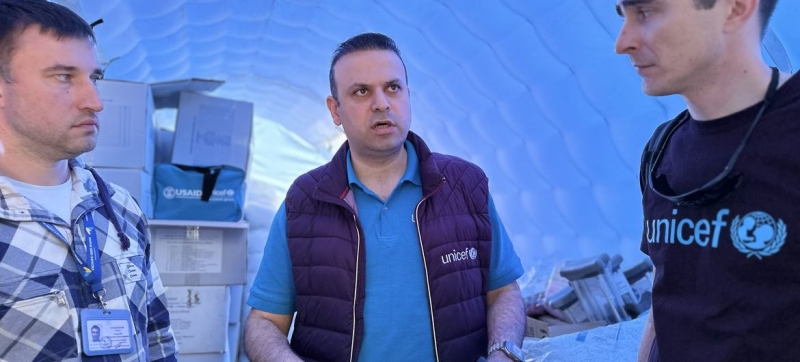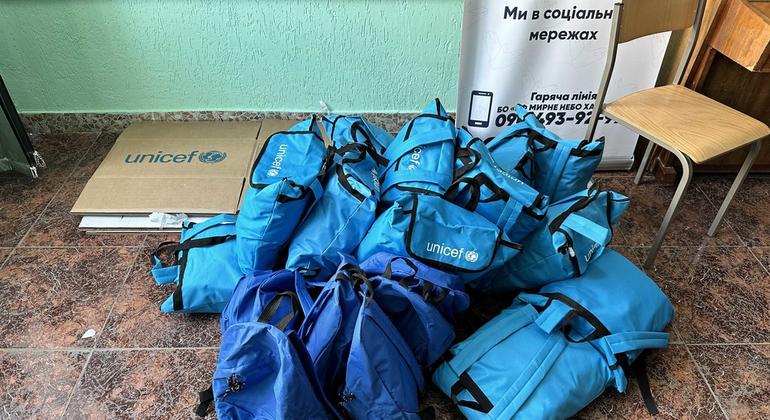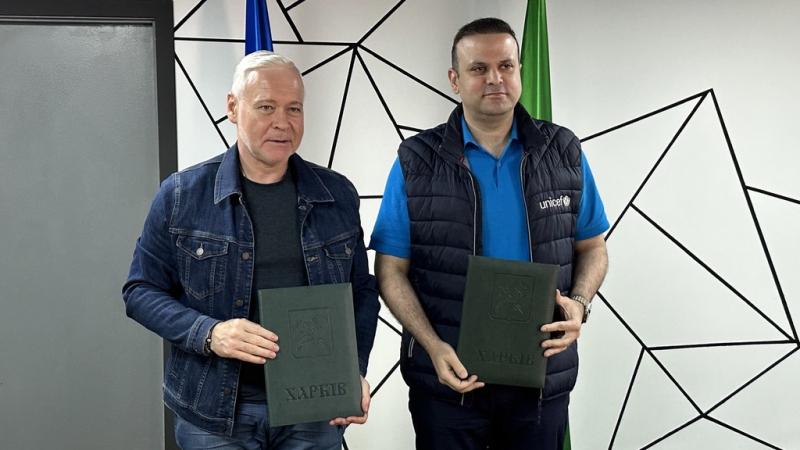
Head of UNICEF Ukraine Munir Mammadzade (center). The head of UNICEF in Ukraine talks about evacuations in the Kharkov region: “People are unlikely to be able to return to their homes in the near future” Peace and security
News from the Kharkov region in recent days has occupied a central place in reviews of what is happening in Ukraine: people are being urgently evacuated from front-line areas. The head of UNICEF in Ukraine, Munir Mammadzade, who recently visited Kharkov, told the UN News Service about how humanitarian agencies help displaced people.
UN News Service: What is the situation in Kharkov now?
Munir Mammadzadeh: From frontline territories, the civilian population is evacuated from villages. During my meeting with the governor yesterday, a figure was announced – 10 700 people were evacuated, including 300 children. Of course, the situation is very difficult. The population was evacuated directly by the state, and volunteers are also involved. Some families evacuated on their own.
I was in a humanitarian hub, where partners, including UNICEF, other UN agencies, non-governmental organizations, are trying to provide internally displaced persons with the full package of possible services at this stage . Those evacuating need to be registered so that they can access the payments that UNICEF is providing jointly with the Ministry of Social Policy, and that they also receive assistance in the form of food, water and hygiene kits.

We prepared, like all humanitarian organizations, for worst-case scenarios. We obviously provided a fairly large batch of hygiene and other kits. Today we have reserves of resources for a population of up to 50 thousand people. At the first stage, the most key and important stage, all the necessary help is provided. Some families had to be based in centers for internally displaced persons, in dormitories.
We prepared, like all humanitarian organizations, for the worst scenarios
I visited the hostel with the local authorities. We met with families who had been evacuated, including families who had taken children into their care and had to leave their homes. There are 113 such children. UNICEF has taken upon itself to provide them with everything they need. We will be working with them for the next six months. The issue will be relevant for a long time, because we understand that, given what is happening, these people will not be able to return to their homes in the near future. Therefore, we need to look for some long-term solutions together with the authorities, talk about this with partners, with donors. We understand that this issue needs to be thought through optimally, to develop a mechanism for long-term support for these families.
UN News Service: How are people coping with the new situation, which seems to be developing according to the worst-case scenario?
MM: This comes in addition to the fact that for the third year now, the population is facing many difficulties. You know, schools are closed, kindergartens are not open. Medical support is also poor due to regular shelling. Of course, all this is very difficult. People hoped for the best until the last moment and did not leave their homes, their native lands, but now, due to this situation, they had to do this, of course.
I talked to a boy who fourteen years old. He was among those who were evacuated recently. It was clearly clear that he was quite seriously injured and needed specialized psychological help. He said that his mother is not mobile and that he follows the news very closely. He showed me photos and videos on his phone of what was happening there. In the context of the conversation, it was obvious that the trauma was quite deep, and I am sure that there are hundreds of such cases.
When we talk about the difficulties that people face, it is, firstly, uncertainty. I asked when I was talking with one of the mothers what their plans were, what they planned to do, whether they would stay in Kharkov, go somewhere, and so on. The mother of three children said that they definitely want to return to their home, but, unfortunately, most likely, they will not have such an opportunity in the near future.

UNICEF Representative in Ukraine Munir Mammadzade and Kharkiv Mayor Igor Terekhov after signing the memorandum.
There is immediate, emergency assistance from the UN system and humanitarian partners, but looking into the long term, how can we help these children and their families? There is, of course, a lot of uncertainty here. Even though we are entering summer, there is already talk of how difficult it will be this winter, because the power supply system is completely dysfunctional in many regions, especially border areas. Everything suggests that the winter will be quite difficult.
We signed a joint initiative with the mayor of Kharkiv to prepare for winter. The city had already received a fairly large number of internally displaced persons before the recent events. There are problems with electricity, water and sanitation. All this is complicated by the fact that the needs and humanitarian needs of Ukraine are not as high on the agenda of donors and partners now – compared to the beginning of the full-scale invasion. In this regard, it seems to me that the biggest challenge will be how we survive the coming winter.
Read also:
